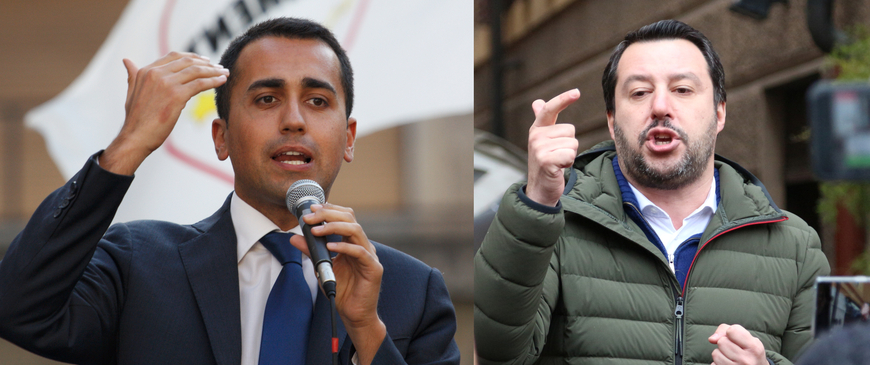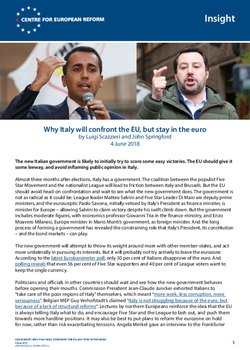
Why Italy will confront the EU, but stay in the euro
The new Italian government is likely to initially try to score some easy victories. The EU should give it some leeway, and avoid inflaming public opinion in Italy.
Almost three months after elections, Italy has a government. The coalition between the populist Five Star Movement and the nationalist League will lead to friction between Italy and Brussels. But the EU should avoid head-on confrontation and wait to see what the new government does. The government is not as radical as it could be: League leader Matteo Salvini and Five Star Leader Di Maio are deputy prime ministers, and the eurosceptic Paolo Savona, initially vetoed by Italy’s President as finance minister, is minister for Europe – allowing Salvini to claim victory despite his swift climb down. But the government includes moderate figures, with economics professor Giovanni Tria in the finance ministry, and Enzo Moavero Milanesi, Europe minister in Mario Monti’s government, as foreign minister. And the long process of forming a government has revealed the constraining role that Italy’s President, its constitution – and the bond markets – can play.
The new government will attempt to throw its weight around more with other member-states, and act more unilaterally in pursuing its interests. But it will probably not try actively to leave the eurozone. According to the latest Eurobarometer poll, only 30 per cent of Italians disapprove of the euro. And polling reveals that even 56 per cent of Five Star supporters and 40 per cent of League voters want to keep the single currency.
The new Italian government will have two key priorities: boosting the economy and reducing migration from across the Mediterranean.
Politicians and officials in other countries should wait and see how the new government behaves before opening their mouths. Commission President Jean-Claude Juncker exhorted Italians to “take care of the poor regions of Italy” themselves, which meant “more work, less corruption, more seriousness”. Belgian MEP Guy Verhofstadt’s claimed “Italy is not struggling because of the euro, but because of a lack of structural reforms”. Lectures by northern Europeans reinforce the idea that the EU is always telling Italy what to do, and encourage Five Star and the League to lash out, and push them towards more hardline positions. It may also be best to put plans to reform the eurozone on hold for now, rather than risk exacerbating tensions. Angela Merkel gave an interview to the Frankfurter Algemeine Zeitung on 3rd June, in which she belatedly responded to Emmanuel Macron’s proposals for reform. She demanded greater oversight over national governments’ financial and fiscal policies as the price for any further risk-sharing. A European Monetary Fund (EMF) or a eurozone investment fund would not disburse money automatically if a country got into trouble, and would demand strict conditionality. She hinted that the EMF might demand sovereign debt restructuring in exchange for loans, which would have the effect of raising Italian, Spanish and Portuguese borrowing costs ex ante. This intrusive price for risk sharing inflames nationalist sentiment, especially in Italy, and it is not worth starting a major fight over eurozone reform if the final outcome will do little to strengthen the single currency.
The new government will pick some fights with the EU to show it is asserting itself, but will balk at all-out war. It is likely to try to raise the government deficit to boost growth and implement some of its election promises, for instance reducing taxes. But electoral promises in Italy are rarely stuck to, and the government might maintain a posture of confrontation with Brussels and Berlin while governing quite moderately. Some of the coalition’s original promises have already been watered down. For example, instead of a universal basic income, the new government proposes an enhanced unemployment benefit limited to two years. And there are issues other than the economy on which Italy can ‘reassert sovereignty’, ranging from loudly pushing for more EU solidarity over migration to striking high-profile business deals with Russia.
There are two possible strategies for the new government to take: a moderate fiscal expansion, which leads to confrontation with the EU, but stops short of calling Italy’s debt sustainability into question; or a more extensive fiscal boost that would risk Italy’ exit from the eurozone. The high cost of exit is very likely to prompt Five Star and the League to choose the former route.
As long as a fiscal boost does not lead investors to lose confidence in Italy’s debt sustainability, the eurosceptic coalition could claim victory against the diktat of Brussels while averting a fully blown crisis.
In the first scenario, to show that it is taking control over fiscal policy, the government might enact a budget that would lead to a larger government deficit, up from 1.9 to say 2.9 per cent of GDP. As the new government only has a majority of 6 votes in the upper house, which must approve budgets, anything more ambitious would struggle to pass. Such a fiscal stance would be in keeping with the eurozone’s fiscal rule that deficits should be lower than 3 per cent. But it would violate others: that the ‘structural’ deficit (the deficit adjusted to the economic cycle) should not exceed 0.5 per cent of GDP; and the rule mandating how quickly governments should attempt to reduce their debt. Such a moderate fiscal expansion could lead to exactly the kind of fight with Brussels that would allow the populists to claim victory against the diktat of Brussels. But it would be unlikely to lead to investors to conclude that Italian debt was no longer sustainable, so it would not provoke a full-blown crisis. And, as a result, there would be little that the rest of the EU could do – or would want to do – to force Italy into line. The European Commission has shied away from recommending fines for non-compliance with the eurozone’s fiscal rules – either for Germany and France, when they broke the rules in 2002-03, or for Spain and France in recent years when they have refused to reduce their deficits and debts as quickly as the fiscal rules demand. The Commission and the rest of the eurozone could choose not to sanction Italy on this occasion, and let populists have a victory that costs little.
The second scenario is that Five Star and the League might try to enact policies that lead to a confrontation both with the debt markets and the rest of the eurozone. Their fiscal plans in their previous coalition contract, which included a flat tax and a universal basic income, would have raised the deficit to around 7 per cent of GDP. And their plans for a ‘scrip currency’ (whereby the government pays contractors in IOUs, and anyone can use these IOUs to pay taxes) would, if enacted, convince investors that Italy was on its way out of the euro. It would be difficult for the government to push through with these plans in Italy’s constitutional framework, which mandates a balanced budget over the medium-term. And the parties may want to avoid another confrontation with Italy’s president.
It would be unwise to wholly exclude the possibility that Italy might choose fiscal policies that are incompatible with euro membership. If that happened, there would be little that the rest of the eurozone could do to prevent Italy from crashing out of the euro, other than the European Central Bank (ECB) buying up Italian debt in an attempt to keep Italy in. But the ECB has no mandate for purchases of a specific government’s bonds under the Outright Monetary Transactions (OMT) policy without that government entering an EU austerity and reform programme. In the panic, the cost of borrowing would rise dramatically, and the crisis would also hit the Italian banking sector more broadly, since Italian banks hold so much of Italy’s debt. It is highly likely that this would trigger a political backlash in Italy. Dozens of MPs would defect, and the government might be forced to step back from the brink to access emergency help from the European Stability Mechanism, the bail-out fund, and the OMT.
Politicians and officials in other countries should wait and see how the new Italian government behaves before opening their mouths.
However, if Rome refused to blink, the crisis would accelerate: there would be a run on Italian debt and Italy would default on a portion of its debt; and it would introduce capital controls and ultimately a new currency, but in the midst of collapsing credit and consumer confidence. It seems unlikely that Five Star or the League would be willing to unleash such a crisis. If they did, the outcome would be catastrophic for the eurozone and the EU as a whole. Spanish and Portuguese borrowing costs also rose sharply after President Mattarella’s veto on Savona’s appointment as finance minister, albeit to a lesser extent than Italy’s. Investors fear that, if Italy defaulted and left the euro, the financial crisis that ensued would lead to debt sustainability problems elsewhere, as investors and banks dumped risky assets and bought safe government bonds in northern Europe. There would be a high risk that the euro as a whole would unravel. The resultant depression would dwarf the first euro crisis, since several countries would redenominate debts into new currencies or default at the same time. The corporate sector would face a wave of bankruptcies and litigation over the revaluation of assets. Banks in the remaining eurozone would face huge losses and some might have to be recapitalised by the government.
The outcome is uncertain, but it seems more likely that a populist Italian government would choose to make a show of confronting the rest of the eurozone over the fiscal rules, rather than governing in a way that led to market panic, default and a euro exit. To avoid such a scenario, the EU should try to engage constructively with Rome. While progress on eurozone reform will be difficult, the EU could help Italy more in dealing with migration, for example by doing more to negotiate readmission agreements with African countries. If Rome is treated as a potential partner, it is less likely to lash out.
Luigi Scazzieri is a research fellow and John Springford is deputy director at the Centre for European Reform.


Comments
It's a pity that the CER was not common knowledge before the referendum.
I hope it's not too late now that Brexit looms.
Mrs.May should read you articles, having said that her £20bn birthday present for the NHS would be paid for by the Brexit dividend. That has been quickly shown to be anyther of her magic money trees & she had to admit some would come from (unspecified) taxes.
Add new comment